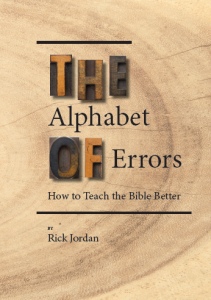This week, I saw that my denomination posted an article on Facebook about a new ministry. A comment below the announcement read, “Fake Baptists. Don’t believe the Bible is God’s word.”

Although the comment was not directed to me personally, I was offended by the dismissive comment and the Pharisaical attitude. Who was this person to set himself up as the judge of who believes the Bible as God’s word and who does not? Has he met and talked with anyone affiliated with this ministry? Did he go to the “About Us” tab of the website and read, “Although we call ourselves Christian, we don’t believe that the Bible is God’s word?”
Return the judgment?
I was tempted to give him a response that was as harsh and judgmental. Maybe something about his inability to write complete sentences. Or, something about his lack of intelligence. Or, something about his lineage.

Instead, I decided to let it go for the night. Rest on it. Ponder and pray about what, if anything, I should do in response. Was there a gracious, redemptive, unifying way to respond?
A better way
In this time of pondering, I recalled something I heard Brian McLaren say about persons who make harsh accusations of him and his beliefs. He tries to respond something like, “If you ever want to hear a different side of that issue, let me know.”
Many people have beliefs that have no rooting in the Bible. They believe what they believe because their pastor told them so or their parents told them so, not because the Bible told them so. If a Bible passage or an overall theme of scripture is offered that contradicts their belief, they won’t budge. Indeed, they may make the entrenchment even deeper.
I like Brian’s method. He does not do a tit-for-tat lecture on why the other is wrong or stupid or evil. Instead, he offers to join a conversation at the other’s initiative. Who knows? A crisis may occur that shakes the other’s confidence in what they had always thought. If so, maybe they would like to hear another side to this dilemma.
Open to converse and convert?

I had with a terminated pastor who was “between pulpits,” as he said and wanted me to help him find another church to pastor. That was one of the roles that I had with my denomination – “reference and referral” we called it. He said, “I’ve never seen myself in your camp before, but I understand you’ll help pastors who are divorced.” Until his divorce, he saw us as an organization that did not believe the Bible. Now, wanting to continue his ministry, he was willing to compromise his high fundamentalist standards. Those preachers and teachers and friends he had been associated with now rejected him. He was damaged goods. The believed that the Bible was God’s word of judgment, punishment, and exclusion. He needed persons who would hear him out, have compassion for him, and give him guidance. He came to realize that we did believe the Bible was God’s word – and that it is a word of grace and reconciliation and hope.
My plan

This week, I decided to DM the minister who posted the judgment on Facebook. “Hi Mark, We have not met. My only contact with you is from the comment you posted on the Cooperative Baptist Fellowship Facebook page, ‘Fake Baptists. Don’t believe the Bible is God’s word.’ I have been affiliated with CBF my entire ministry. I do believe the Bible is God’s word. Everyone I worked with in CBF does as well. When you would like to speak with a person about how a Baptist might be a believer in Jesus Christ and a student of God’s word yet see things differently from your way of seeing things, I invite you to DM me. I would welcome that conversation.”

